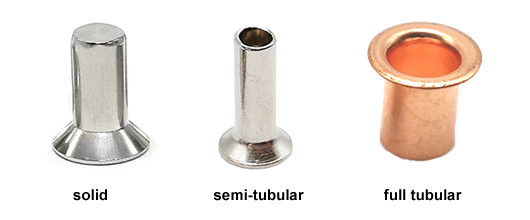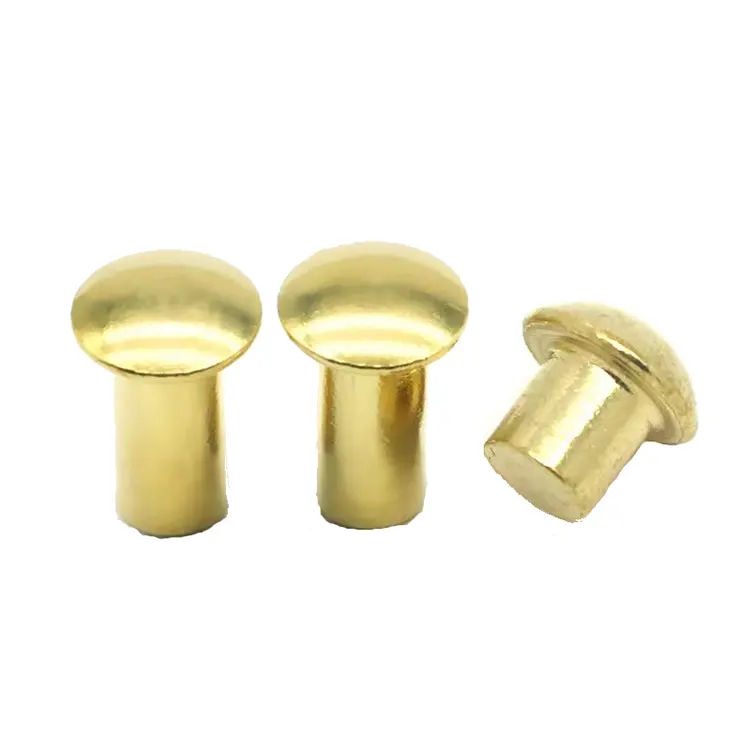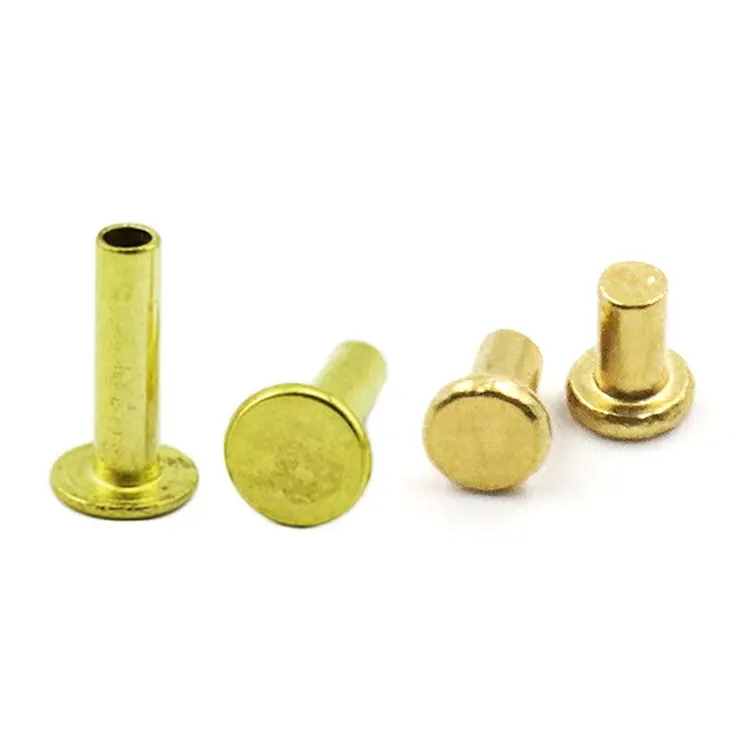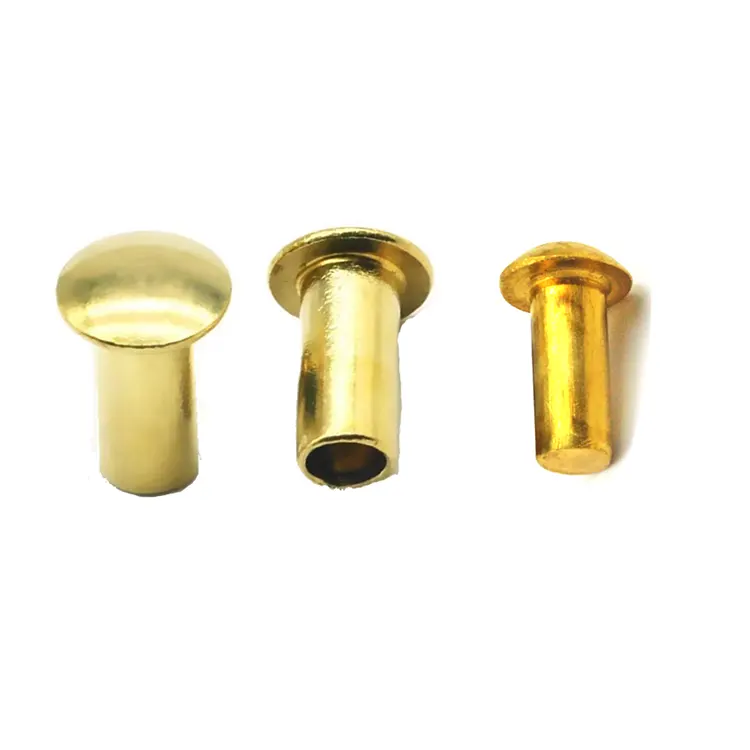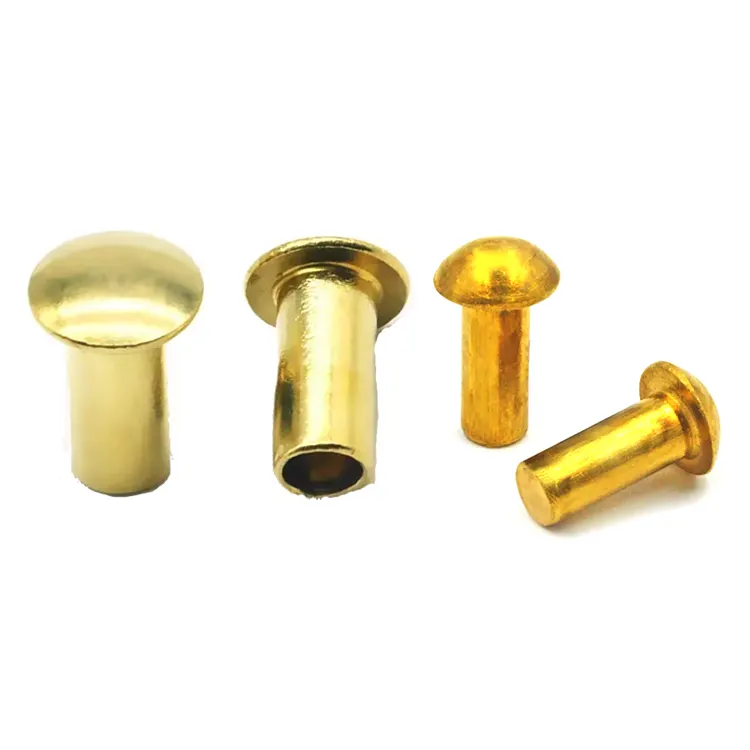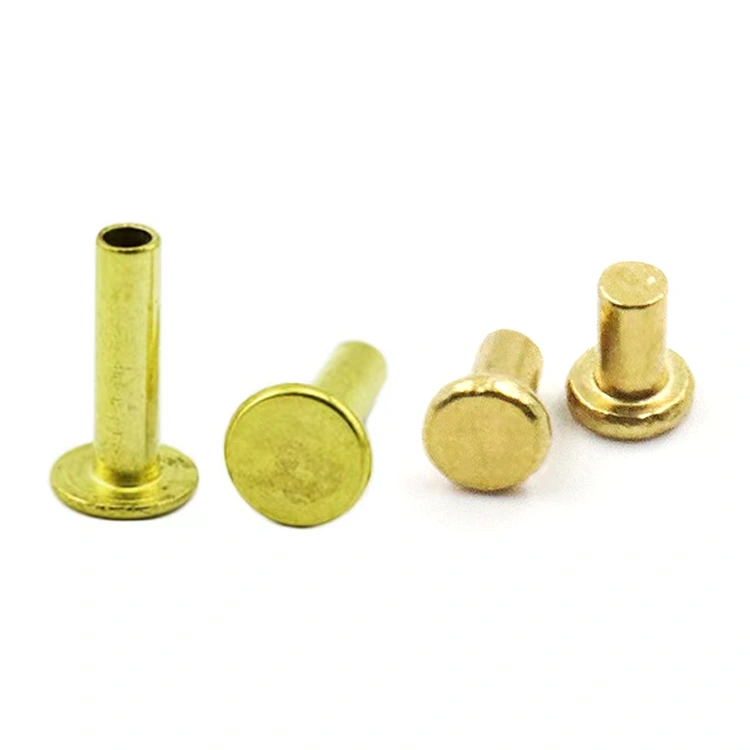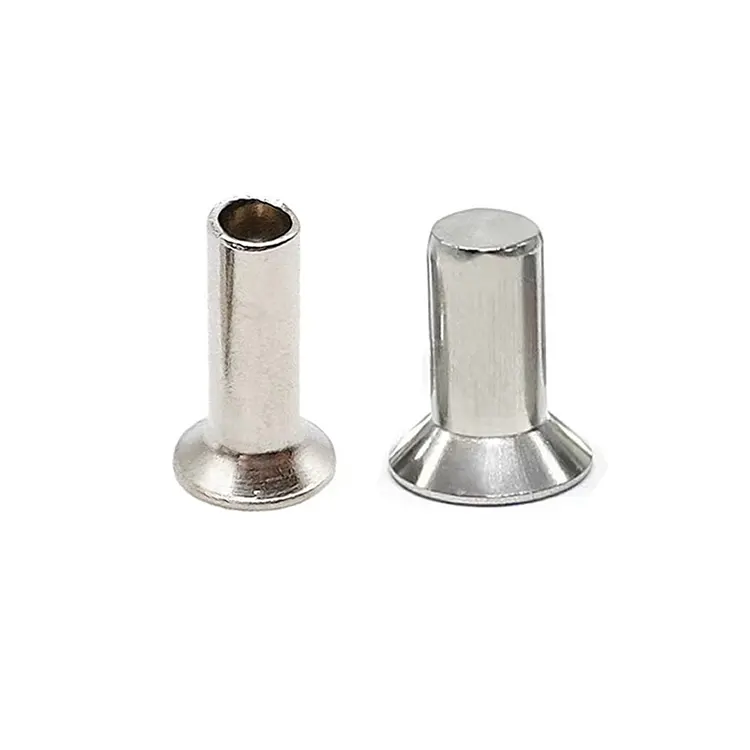Nity
As one of professional manufacturer in China, Notin would like to provide you Rivets. And we will offer you the best after-sale service and timely delivery.
What is a rivet?
A rivet is a permanent mechanical fastener used to join two or more materials. Rivets work by inserting a metal pin into an aligned hole and deforming the end, creating a strong, secure, and durable connection. Unlike temporary fasteners like screws, rivets do not rely on threads, but instead form a permanent connection, making them ideal for applications requiring high strength, durability, and vibration resistance.
Classification of Rivets
Rivets are typically categorized by head shape, degree of hollowness, or material.
Based on head shape, rivets can be classified as flat head rivets, round head rivets, countersunk head rivets, mushroom head rivets, universal head rivets, truss head rivets, etc.

Based on degree of hollowness, rivets can be classified as solid rivets, semi-tubular rivets, or full tubular rivets.
Based on material, rivets can be classified as brass rivets, stainless steel rivets, steel rivets, aluminum rivets, copper rivets, etc.
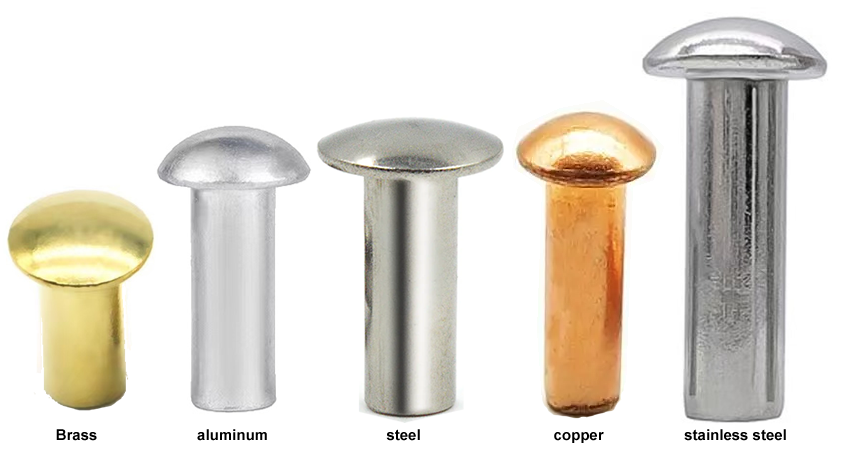
What surface finishes are available for rivets?
Rivet surfaces are typically treated with rust-proofing treatments, primarily electroplating, including zinc plating, nickel plating, chrome plating, tin plating, gold plating, and silver plating. Electroplating is a common rust-proofing method for rivets. It applies a layer of plating to the rivet surface through physical or chemical methods. The plating effectively prevents corrosion and rust, while also providing a certain aesthetic effect.
Another special surface treatment method is head coating. Head coating is performed after the rivet is electroplated. This allows for a variety of colors on the rivet head, achieving an aesthetically pleasing finish.
Aluminum rivets cannot be electroplated, but they can be anodized. Anodizing also allows for a variety of color options, but the unit price is higher than electroplating.
Rust-proofing the rivet surface is crucial, effectively extending the rivet's service life and ensuring a secure connection. Different rust-proofing methods are suitable for different environments and applications, so the choice should be tailored to the specific situation.
- View as
Nity z łbem okrągłym z mosiądzu
Nuote Metals specjalizuje się w produkcji i sprzedaży mosiężnych nitów z łbem okrągłym. Znajdujemy się w Dongguan w Chinach, mieście o silnym rozwoju przemysłowym. Nasze miedziane nity z łbem półwypukłym składają się z trzpienia i kołpaka wykonanych ze stopu mosiądzu. Częściowo wypukła konstrukcja głowicy zapewnia równomierny rozkład nacisku, zapobiegając uszkodzeniu powierzchni złącza. Charakteryzują się połączoną przewodnością elektryczną i odpornością na korozję, prostą konstrukcją, łatwą instalacją, wysoką niezawodnością i długą żywotnością.
Czytaj więcejWyślij zapytanieNity mosiężne
Nuote Metals produkuje nity mosiężne w Chinach. Nity mosiężne są wykonane głównie ze stopu miedzi i cynku, materiału oferującego szereg zalet. Doskonała odporność na korozję mosiądzu pozwala mu wytrzymać długotrwałe użytkowanie w wilgotnym środowisku bez rdzewienia, dzięki czemu nadaje się do użytku na zewnątrz lub w warunkach wysokiej wilgotności. Mosiądz posiada również wytrzymałość i twardość, dzięki czemu jest w stanie wytrzymać naprężenia mechaniczne, zachowując jednocześnie dobrą wytrzymałość i odporność na pękanie. Mosiądz ma również doskonałą przewodność elektryczną i cieplną, dzięki czemu nadaje się do stosowania w sprzęcie elektronicznym i termicznym. Gładka powierzchnia mosiądzu pozwala na łatwe galwanizację lub polerowanie, podnosząc jego estetykę. Te właściwości sprawiają, że nity mosiężne są preferowanym wyborem w wielu gałęziach przemysłu.
Czytaj więcejWyślij zapytanieNity z łbem płaskim, mosiężne
Nuote Metals specjalizuje się w produkcji mosiężnych nitów z łbem stożkowym. Nasze nity wykonane są z mosiądzu H65, który ma wysoką zawartość mosiądzu, jest miękki i łatwy do formowania oraz jest mniej podatny na pękanie podczas procesu nitowania. Nity mosiężne z łbem płaskim składają się z łba i trzonu, przy czym trzon jest pusty w przybliżeniu w połowie jego długości. Podczas montażu nit wkładany jest do wcześniej wywierconego otworu. Za pomocą specjalistycznej nitownicy i stempla koniec trzpienia rozszerza się i tworzy łeb po drugiej stronie, tworząc połączenie zaciskowe. Proces ten polega na odkształceniu plastycznym metalu, eliminując potrzebę spawania lub klejenia, czyniąc go prostym i wydajnym.
Czytaj więcejWyślij zapytanieNity z łbem grzybkowym z mosiądzu
Nity z łbem grzybkowym mosiężnym składają się z łba i korpusu. Głowa jest okrągła i lekko spłaszczona, przypominająca kapelusz grzyba. Korpus jest półpusty, co oznacza, że ma dziurę pośrodku, ale nie przechodzi przez nią całkowicie. Nazywa się je mosiężnymi nitami z półpustym łbem grzybkowym. Niektóre nity mają solidny korpus, zwany mosiężnymi nitami z łbem grzybkowym. Podczas montażu wykorzystuje się specjalistyczne narzędzie polegające na włożeniu korpusu w wywiercony wcześniej otwór. Wywierany jest nacisk w celu odkształcenia korpusu, powodując jego rozszerzenie i uchwycenie materiału, tworząc bezpieczne połączenie. Firma Nuote Metals specjalizuje się w produkcji mosiężnych nitów z łbem grzybkowym.
Czytaj więcejWyślij zapytanieNity z łbem płaskim, mosiężne
Nity mosiężne z łbem płaskim to metalowe pręty z kapturkiem na jednym końcu. Osiągają nitowanie poprzez odkształcenie lub pasowanie wciskowe i są powszechnym elementem złącznym. Płaska konstrukcja głowicy zmniejsza występy powierzchniowe, dzięki czemu nadaje się do zastosowań wymagających dużej płaskości. Odporność na korozję mosiądzu zapewnia stabilność połączenia nawet w wilgotnym i korozyjnym środowisku. Nuote Metals specjalizuje się w produkcji mosiężnych nitów z łbem płaskim. Mamy tysiące form i możemy produkować różne specyfikacje nitów. Obsługujemy również niestandardowe projekty i próbki.
Czytaj więcejWyślij zapytanieNity z łbem stożkowym mosiężnym
Nity z łbem stożkowym mosiężnym składają się głównie z łba i trzpienia. Łeb stożkowy pozwala na montaż równo z powierzchnią przedmiotu obrabianego, eliminując występy, które mogłyby mieć wpływ na wygląd lub funkcję. Półpusty trzpień odkształca się podczas procesu nitowania, uzyskując połączenie. Taka konstrukcja nie tylko poprawia wydajność instalacji, ale także zwiększa niezawodność połączenia. Nuote Metals specjalizuje się w produkcji mosiężnych nitów z łbem stożkowym, charakteryzujących się dużą precyzją i gładką, pozbawioną zarysowań powierzchnią. Zapraszamy przyjaciół z całego świata do odwiedzenia naszej firmy i współpracy z nami.
Czytaj więcejWyślij zapytanieWhat are the advantages of rivets over other fasteners?
1. Ease of Installation
Rivets are fast to install, and even fully automated for high-volume applications, resulting in a simple and efficient operation process.
2. Connection Reliability
The riveting process is standardized, with strict quality control, resulting in highly stable connections. Visual inspection allows for quick verification of connection quality.
3. Vibration and Impact Resistance
Rivets connect through deformation or interference fit, providing strong clamping force and excellent vibration resistance, capable of withstanding vibration and shock.
4. Low Cost
Rivets are easy to install and can be fully automated, saving significant labor costs.
What are the advantages and disadvantages of rivets made of different materials?
Aluminum Rivets
Advantages: Lightweight, reduces overall product weight, low cost, suitable for general civilian applications.
Disadvantages: Low tensile and shear strength, unsuitable for high-strength workpieces, prone to electrochemical corrosion when in contact with metals such as stainless steel.
Stainless Steel Rivets
Advantages: Strong corrosion resistance, high hardness, suitable for high-strength workpieces (such as marine equipment)
Disadvantages: Higher cost, typically more expensive than aluminum rivets of the same specification.
Brass and Copper Rivets
Advantages: Excellent conductivity (such as connecting electronic components), good corrosion resistance.
Disadvantages: Higher cost, more difficult to process.
Steel Rivets
Advantages: High hardness, high connection reliability, and wide applicability.
Disadvantages: Compared to other materials, iron rivets are more prone to rusting.
What are the main applications of rivets?
Rivets have a wide range of uses, from small items like a pair of scissors to large items like airplanes and ships, as well as in high-precision medical applications.
Industrial Manufacturing
Rivets are used in a wide variety of industrial fields, wherever there is a need to connect two or more materials.
Electronics
Rivets secure heat sinks and chips, providing both vibration damping and noise reduction, and are widely used in the cooling systems of electronic products such as computers and mobile phones.
Automotive
Rivets are widely used to connect components of automobile bodies and chassis, such as doors and hoods. Their lightweight and corrosion-resistant properties make them an indispensable joining method in automotive manufacturing.
Aerospace
In aircraft manufacturing, rivets are used to connect different fuselage components, such as wings and tailplanes. Millions of rivets create high-strength, corrosion-resistant joints. Aluminum and titanium alloy rivets are often used to connect components of corresponding materials, ensuring stability in extreme environments.
Rivets are used everywhere. The above examples only represent a small number of their applications. We see rivets everywhere in our daily lives, such as on scissors, folding beds, and strollers etc. Rivets can be customized to different sizes and materials depending on the application.
Nuote Metals has specialized in the rivet industry for over a decade. Our factory is located in Dongguan, a city known as the "World Factory," a city with a developed industry and convenient transportation. This allows us to respond quickly when acquiring raw materials and supporting surface treatments, meeting our customers' needs for quick access to samples and bulk orders. We produce 10 million rivets daily and have molds of various specifications, allowing us to produce rivets as small as 0.8mm and as large as 10mm. We welcome your inquiries and visits.






